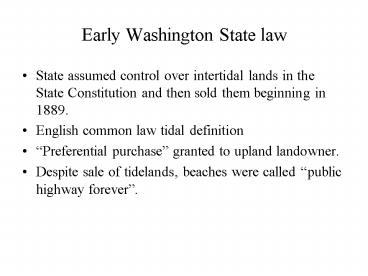Early Washington State law - PowerPoint PPT Presentation
1 / 12
Title:
Early Washington State law
Description:
State assumed control over intertidal lands in the State Constitution and then ... Marked end of sale of tidelands. Tidelands ~75% in private hands in 1971, now ~60 ... – PowerPoint PPT presentation
Number of Views:113
Avg rating:3.0/5.0
Title: Early Washington State law
1
Early Washington State law
- State assumed control over intertidal lands in
the State Constitution and then sold them
beginning in 1889. - English common law tidal definition
- Preferential purchase granted to upland
landowner. - Despite sale of tidelands, beaches were called
public highway forever.
2
Shoreline Management Act (SMA) of 1971(state
law)
- Motivated in part by early sales of tidelands
- States
- The legislature finds that the shorelines of the
state are among the most valuable and fragile of
its natural resources and that there is great
concern throughout the state relating to their
utilization, protection, restoration, and
preservation... There is, therefore, a clear and
urgent demand for a planned, rational, and
concerted effort, jointly performed by federal,
state, and local governments, to prevent the
inherent harm in an uncoordinated and piecemeal
development of the state's shorelines.
3
SMA (contd)
- Regulated significant development within 200 ft
of OHMW - Marked end of sale of tidelands
- Tidelands 75 in private hands in 1971, now 60
4
Coastal Zone Management Act (CZMA) of 1972
(federal law)
- Motivated in part by SMA
- Mandated each coastal state to develop a
shoreline plan. - Washington was the first state to have plan
approved in 1976.
5
Endangered Species Act (ESA) of 1973(federal law)
- States
- Whenever any species is listed as a threatened
species the Secretary of the Interior shall
issue such regulations as he deems necessary and
advisable to provide for the conservation of such
species. - Used to mandate environmentally friendly
behavior in a number of construction projects
near waterways in the Pacific Northwest - http//endangered.fws.gov/esa.html
6
Treaty of Point No Point (Boldt Decision) (case
law, US v. Washington, 1974)
- Treaty of Point No Point (1855) states
- The right of taking fish and usual and
accustomed grounds and stations is further
secured to said Indians, in common with all
citizens of the United States and of erecting
temporary houses for the purposes of curing
together with the privilege of hunting on open
and unclaimed lands. Provided, however, that they
shall not take shell-fish from any beds staked or
cultivated by citizens. - Boldt Decision (1974) states that Native
Americans entitled to 50 of the harvestable
salmon in Puget Sound waters. - Precipitated formation of NWIFC
7
(No Transcript)
8
Growth Management Act (GMA) of 1990(state law)
- Seeks to
- Reduce sprawl
- Encourage urban growth
- Retain and enhance open space
- Encourage historical preservation
- Mandates notice of land-use action within 500 ft
of agricultural lands - Delegates most authority to local governments
(cities and counties) - Dictates use of best available science (BAS)
9
Best Available Science (BAS)
- GMA states that the following should be
characteristic of BAS - Peer review
- Reproducible methods
- Logical conclusions
- Quantitative methods
- Proper context
- Referenced
10
Critical Areas Ordinance (CAO) of 2005(King
County ordinance)
- Motivated by the GMA
- States
- Critical area any area that is subject to
natural hazards or a land feature that supports
unique, fragile or valuable natural resources
including fish, wildlife or other organisms or
their habitats or such resources that carry, hold
or purify water in their natural state. - http//www.metrokc.gov/mkcc/cao/critical_areas_150
51.pdf
11
King County CAO (contd)
- Includes
- Aquatic areas
- Erosion hazard areas
- Landslide hazard areas
- Wetlands
- Many activities are grandfathered, but limits
(with a few exceptions) new activities within 300
ft of these critical areas - Definitions practices are set by BAS
12
Common Enemy doctrine (state case law, legal
precedent)
Critical areas ordinance (King County)
- Trigg v. Timmerman (1916) Laurelon Terrace v.
City of Seattle (1952) states - The flow of surface water along natural drains
may be hastened or incidentally increased by
artificial means, so long as the water is not
ultimately diverted from its natural flow onto
the property of another. - Softened recently (late 1990s) to prevent
upstream property owners from artificial
collection - Important precedent which caused the dismissal of
law suits filed in the Perkins Lane slide































